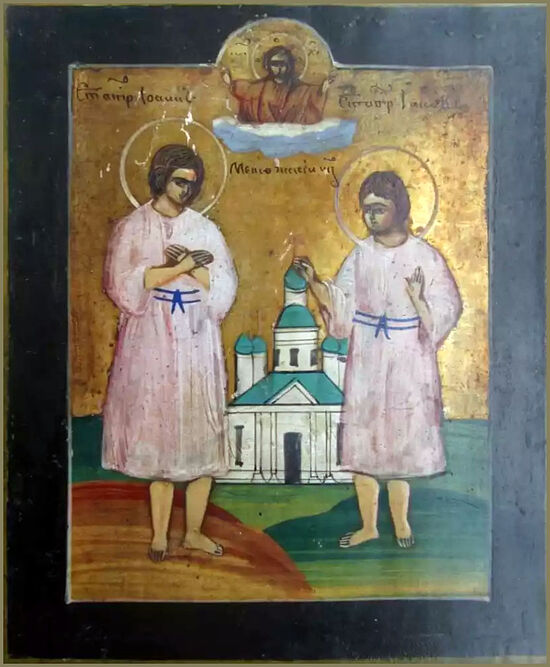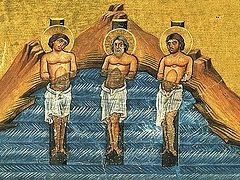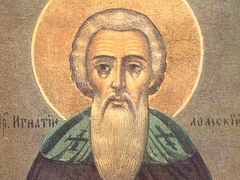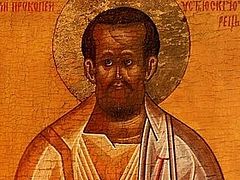There are times when we can only marvel at how God glorifies His saints—His ways are truly unfathomable to us. Let the Life of these two holy children be a comfort and consolation to any parent who has ever lost a child.
Sts. Jacob and John, youths of Meniuzh, were the children of pious parents Isidore and Barbara, who worked the land in one of the villages of Medvedsky pogost, Novgorod governate, during the reign of the sovereign Grand Prince John Vasilievich IV, under the holy Metropolitan Phillip of Moscow and Archbishop Pimen of Novgorod—in the latter half of the sixteenth century (c. 1570). These youths were called saints, because even in their youth, you could even say in their childhood, when the eldest was five and the younger was three, they were stricken with a sudden and unusual death. Here is how it happened.
One autumn day, Isidore and his wife Barbara went out to their usual work, killed a ram, and preparing it as needed for food, set out for a field that was located far from their home, leaving their children alone without any supervision. They had seen what their father had done to the ram, and accepting that as an ordinary game or some fun, got the idea of having the same fun themselves. The older brother then said to the younger, “Brother, let’s do what our father did”, and out of his foolishness, not foreseeing the terrible consequences that could come of it, he took a stick and hit his younger brother on the head. The boy died immediately and fell to the ground. Seeing his dead brother, John was very frightened and not knowing what to do, he hid himself like an infant in the brick oven, behind the logs that had been earlier placed there to dry in case of a rainy autumn. When the father and mother returned in the evening from their work and found their youngest son dead, they wept and sobbed bitterly. When they couldn’t find their older son anywhere, their sobbing increased, and this drew the attention of their relatives and friends who came to their house. When these were convinced of the sad events, many were amazed and grieved with the boy’s parents so strongly that they were barely able to calm down in the end. After this the mother, as usual, lit the wood in the oven, not knowing that her other son was hiding behind it. When the wood had burned away and Barbara looked in the oven, she saw there the her son, who was dead, but whose body was completely whole and unharmed by the flames.
The All-Good Lord, Who looks down from on high with His All-Seeing Eye upon all those living on earth, and knowing the guilelessness and innocence of these children, desired to glorify His name through them, honoring their undefiled and pure bodies with incorruption and numbering them among His saints—one as innocently killed, and the other as having received a martyr’s death from the fire. Hearing his wife Barbara’s shouts and lamentations, Isidore immediately ran to her, and also seeing his son lying in the stove dead but whole and unharmed by the flames, was filled with fear and awe. Therefore he joined to his wife’s lamentations his own great cry. At this cry the relatives and friends again gathered, and when they saw the miracle, were greatly amazed and glorified God Who had done this thing. And because word of this miracle quickly spread far and wide, the name of God began to be glorified in other places as well. Having finally wept over their children, Isidore and Barbara dressed them in funeral clothes, placed them in coffins, and committed their bodies to the earth according to the Christian rite at their parish church dedicated to the Holy Hierarch and Wonderworker Nicholas in the Medvedsky pogost.
Several days after the burial of the children John and Jacob, their coffins were seen floating on a small lake located two versts (about 1.3 miles) from the Meniuzh monastery. And here is what was told of that appearance.
The villagers of the area, who had the custom of hunting in the forest for birds and beasts, set out one morning on the hunt with the intention as usual of returning home the same evening. But they got lost in the forest and were not able to find the road to home, and so they stayed in the forest. Continuing on the third day to search for the road, the hunters at last came to that same lake mentioned above and saw two coffins floating upon it. After careful examination convinced that these were the very coffins in which John and Jacob had been buried, the hunters began begging the holy youths to show them the way home—and then their eyes suddenly rested upon a small path, upon which they walked to their homes.
When they arrived home, the hunters hastened to tell their neighbors about what had happened to them. The priests and other clergy of the surrounding villages along with a multitude of people set off for the lake, which the hunters showed them. They saw that the familiar coffins were indeed floating on the water, and therefore they decided to take them back to the church of St. Nicholas where they had been buried. But the village hunters revealed that the saints had appeared to them in a dream and desired to be buried not in the cemetery of that church, but in a deserted place at Meniusha, where there had once been a monastery; and so the coffins with their relics were taken to that locality, where with due honor they were placed near the brook that flowed there. Soon a chapel was built over their graves.
The All-Good Lord vouchsafed these holy youths the gift of miracle-working, and many people who came to their graves began receiving healing of various conditions and sicknesses. Here is an instance of one such healing that happened a few years after this, according to God’s will, which particularly served to glorify the holy youths and inspired the building of a church on their place of burial.
One monk named Makary who was walking from the city of Pskov to Novgorod past the place where the relics of the holy youths John and Jacob reposed, was suddenly stricken with a terrible illness for which there was no known cure. In this onerous and bitter condition he somehow made it to the relics, prayed before them with all fervor and faith—and immediately received healing. Filled with the most profound gratitude to the holy youths for the mercy he received from them, the monk decided to remain by their relics with the intention of applying every effort to find the means for renovating the former Meniuzh monastery. With this aim, he proclaimed his healing to all the pilgrims who came to the relics, and begged them to donate toward the building of a church, which by God’s mercy and the prayers of His saints he was able to build over the relics of the holy youths through the alms of visitors and pilgrims to the holy place. This monk was later responsible for the rebirth of the Holy Trinity Meniuzh Monastery.
In the reign of the pious Soveriegns, Tsar Ivan and Grand Prince Peter Alexeyevich, under Metropolitan Cornelius of Novgorod, the relics of the holy youths John and Jacob of Meniuzh were witnessed to and uncovered whole and unharmed, as they repose to this day, granting healing to all who come to them with faith and to the glory of Christ God, to Whom be honor and worship, unto the ages of ages.
The Orthodox Encyclopedia states that although the church at Meniuzh was closed by the communists in the 1930s, people continued to make pilgrimages to honor the relics of Sts. John and Jacob, and healings continued to take place. The church fell into ruin, but veneration of the saints continues to this day. Remaining at the site is a well that has its source under the saints’ graves.




